- Home
- Marie Rutkoski
The Celestial Globe Page 4
The Celestial Globe Read online
Page 4
Something stayed his hand.
The crystal was an even brighter blue than before. Tomik stared disbelievingly.
He had designed the smooth crystal to shine a deeper blue as it got closer to its target, which was the twin Glowstone in Petra’s pocket. The crystal could pick up traces of where Petra had been, which is why it had flickered as soon as Tomik left his shop in search of her. But it would react most strongly to wherever Petra had been recently.
Which meant that Petra was not in the Sign of the Compass when it collapsed.
Tomik laughed with relief. “Petra!” he called, and plunged into the woods. He followed the Glowstone with a light heart, as if he and Petra were small again, and playing a really complicated game of hide-and-seek. A serious voice spoke up inside, reminding him that he would still have to tell Petra that her home was in ashes. But he ignored that voice, growing happier with each darker shade of blue.
The smile on his lips faded when he smelled something rotten.
He inched forward. The stone burned more brightly. The stench grew worse.
At first he thought he was looking at animal carcasses. Yet the four headless corpses on the ground seemed eerily human, though their skin was scaly, and black blood poured from their necks.
With dread, Tomik realized that the Glowstone was leading him into the center of the ring of bodies.
Then a metallic glint on the ground caught his eye. Tomik crouched down and brushed at the snow, uncovering a tiny iron horseshoe. He recognized this—it was the necklace Petra had worn every day since she had returned from Prague.
Tomik picked up the rough trinket and inspected it. Master Kronos didn’t forge this, he decided. It’s misshapen. He turned the horseshoe over, and immediately eliminated the possibility that Petra had made it. A strange language was scratched into the iron. Tomik knew one word—Kronos—but the rest was gibberish.
Trailing from the horseshoe was a broken leather cord that looked as if it had been seared by something. Tomik sniffed a blackened end of the cord. Not fire, he thought. Acid, maybe? Or—his gaze jumped to a headless corpse—something else?
Tomik knotted the cord where it had broken, slipped the necklace over his head, and tucked the horseshoe inside his shirt.
He checked the Glowstone again. As if it were a compass, he turned north, south, east, and west. The blue deepened most when he faced south, so Tomik stepped that way over a body, careful not to let any part of him touch it. Headless or not, dead or not, those things smelled evil.
Tomik walked a few yards away from the bodies. Whatever happened, Petra escaped, he encouraged himself.
He was striding forward, his hand holding the Glowstone outstretched, when his forearm vanished.
With a surprised cry, he jerked back. His arm reappeared. There was his hand, the stone firmly in his fingers. There was his wrist, properly attached to the rest of his body.
“A burned-down house. Four headless monsters. Disappearing body parts,” he muttered to himself, shaking his head. “Petra, you’ve got a lot of explaining to do. And I don’t mean the shrugging-and-ignoring kind of explaining. I mean the sit-down-and-go-over-every-blazing-detail-so-I-can-be-sure-I’m-not-going-mad kind of explaining.”
Tomik dropped the Glowstone into his pocket. Tentatively, he reached out his right hand.
It disappeared again.
This time, Tomik didn’t leap back. He flexed his invisible hand. It seemed to function all right. It just wasn’t there.
And, oddly enough, it was warm.
Tomik exhaled, his breath fogging the air. There was still slushy snow under his feet. He was definitely cold, but his invisible hand wasn’t. Summertime, he thought. It feels like summertime, wherever my hand is.
Tomik took a deep breath, shut his eyes, and walked several paces.
He felt the sun beating down on his skin, and heard a roaring, hissing sound.
He opened his eyes.
Tomik was on a beach.
Squinting against the sunlight, he bent down to scoop up the white, sparkling sand. It was perfect. It was just the right kind of sand for making the clearest glass. It was also the kind of sand impossible to find in Bohemia.
Dreamily, Tomik poured the sand into his pocket. He walked to the water and dipped in his fingers as a foamy wave rushed forward to soak his shoes. He tasted his fingers. Salt.
Tomik checked the Glowstone. It glinted in the sun, but the blue light was gone. He put it back in his pocket and decided to admit something to himself.
He was totally, utterly confused.
So he did what most people in his position would do. He took off his shoes, tied the laces together, slung them over his shoulder, and walked into the sea. No land marked the horizon, though there was a ship anchored not far off. Still fascinated by the fine quality of the sand, Tomik reached down to grasp a handful of the wet grit.
He was so preoccupied with what was in his hand, and by the strange experiences of the day, that he wasn’t prepared for yet one more unexpected turn of events. He didn’t spot the small, empty boat someone had dragged up and left on the dry shore. He didn’t hear the light padding of feet. In fact, Tomik didn’t notice anything until something sharp and cold flicked against his neck: a knife.
“Now then, lad,” a man’s voice laughed in his ear. The man spoke in Czech, but his accent was heavy. “I wouldn’t venture too far out if I were you. This sea’s got a wicked current, and she’ll drag you straight out into deep waters. Best step back, and bide awhile with us.”
“Yeah,” added a younger voice. “And show us what you got in your pockets.”
A rough hand spun Tomik around. The man and boy standing before him had brown skin dusted with dried saltwater. Tomik gasped. “Sea-Gypsies!”
“Didn’t anyone teach you not to call people names?” The man pressed the knife more firmly against Tomik’s throat. “Even if the names are true?”
“Especially if they’re true.” The boy glared.
“Ever tried running in sand, my white lad?” said the longhaired man. “I would say you haven’t. Let me save you the trouble of finding out what it’s like, then. It’s hard and it’s slow. And where would you go?”
“And where’ve you been?” demanded the boy. “This is our beach. How did you get here?”
“I was looking for a friend . . .” Tomik replied haltingly. “I don’t know how I got here. I was in a forest, and—”
The Gypsies exchanged a look.
“—and I somehow ended up here. I know that sounds, um—”
“Like a mess of bad lies? Lucky for you”—the man sighed, as if he had been handed one more worry on top of others—“I believe what you say.”
The boy patted Tomik’s sides, looking for a purse or weapon. Tomik cringed in distaste.
“He’s got a jewel, Treb!” The boy had plucked the Glowstone from Tomik’s pocket.
Treb glanced dismissively at the crystal. “I’m not sure, little cousin. Looks like glass to me.”
“It is.” Tomik strained away from the knife and tried to grab the Glowstone. The boy jerked it out of reach. “It’s just glass with some lead in it. Give it back.”
The boy began to juggle the crystal, watching it flash in the sunlight.
“Stop that!” shouted Tomik. “You’ll drop it! You’ll break it!”
The juggler snorted. “Not likely.”
“Give it back, you filthy little Gyp!”
The man slapped Tomik’s cheek with the flat of his knife. Treb said menacingly, “Let me make something as clear as that shiny rock of yours that you’re never going to see again. Since you seem to be somebody who’d like to keep all his ears and fingers and toes, I’ll clue you in: Gypsy and Gyp aren’t the friendliest words. We’re Roma, and that’s what you’d better call us. Now, why would I bother teaching you this small, but limb-preserving, lesson?”
“You tell me,” Tomik said through gritted teeth.
“I will indeed. Let’s take a stro
ll.”
Tomik was pushed in the direction of the small boat he had noticed too late.
“That’s ours.” Treb nodded at the launch when they reached it. “And now let me introduce you to someone very dear to my heart.” He pointed to the large, anchored ship with its layers of sails. “That’s the Pacolet, as swift a brigantine ship as you’ll ever see. You’ll take care to treat her with respect, for she’ll be your home.”
“My home?”
“Oh, only for a short while,” said Treb, but the reassurance in his voice was mocking. “Only until we reach Sallay, a Moroccan port town stuffed with lowlifes like us. Then we’ll sell you. We’ll get a fair price for a young slave such as yourself.”
“What?” Tomik shoved against the man, but was quickly seized by him and the boy. He bit, elbowed, and kicked. But as the Gypsies wrangled his arms to his sides, Tomik realized that Treb must be telling the truth about their plans. They were not hitting back. They were trying to subdue him without leaving any marks. They didn’t want to damage their new property.
The boy pulled a length of rope out of the launch and bound Tomik’s hands behind his back.
“You hypocrites!” Tomik spat. “You think I’m at fault for calling you what you are, when you’re going to sell me? I have a life in Bohemia, and a family, and friends! I have—”
“A loud mouth.” The man winced. “Pipe down, gadje, or I’ll gag you.”
“Truth be told,” said the boy, “the word gadje ain’t always polite, either. Depending on how you put it.” He said something to the man in their language and they snickered.
“I think it’s time we were off, little cousin, don’t you?”
The boy nodded.
Treb prodded Tomik’s shoulder with one finger. “Get in the boat.”
6
Ask-and-Answer
THE CAPTAIN of the Pacolet frowned as he watched one of his sailors teach the gadje how to tie knots. Treb was farsighted, so even at a distance he could see that the boy was quick to learn. This didn’t improve the man’s mood.
“Someone’s been fiddling with the Loophole,” Treb grumbled to his young cousin. He shoved tobacco in a pipe with his thumb, then clamped the stem between his teeth. “It makes me jumpy, thinking that somebody else knows about our window into Bohemia. Somebody’s widened the opening and, blast him, has turned that window into an open door.”
“Troublesome,” the wiry boy agreed. He leaned against the rope ladder running to the top of the main mast. “Not much we can do about it, though.”
Treb scratched a match into a tiny flame and lit his pipe, puffing. “Do you think he”—he flicked his gaze meaningfully at the Bohemian boy—“knows why our secret seacoast now stretches right up to the doorstep of that village?”
“Guess you’d have to ask him. He seemed pretty clueless, though—wandering around on the hot sand dressed for winter, squinting at the sky like a rabbit coming out of its hole. My money says he didn’t know what he was doing or where he was.”
“How unusual for a gadje,” Treb sneered. “But what if whoever widened that Loophole has his hands on the Celestial Globe? That seacoast’s hardly common knowledge.”
The boy shrugged. “Can’t be the world’s deepest, darkest secret either. Our people found it by accident. Sure as the sun rises, somebody’s got that globe. Don’t matter to me much, though, whether that somebody’s the fellow who ripped open the Loophole or the emperor in his satin shoes or your pet parakeet.”
“I don’t have a parakeet, coz.”
“Darn right you don’t. Stupid birds. But you get my point.”
Treb exhaled a cloud of smoke. “I certainly hope that the emperor doesn’t have his old, dried-up fingers on the Celestial Globe. That’d make our job a lot harder.”
“We’ll find out soon enough who’s got our toy. That’s why I’m here, ain’t it?”
“Right enough,” Treb said. He ruffled the boy’s hair and was rewarded with a grimace. “And I’m glad for it.”
Treb’s cousin stared up at the flag snapping in the wind and sighed.
“Something on your mind?” Treb asked. “Still upset we couldn’t pay a call on your friend? I don’t care how close she lives to the Loophole. Our mission’s a secret one. You knew that when you came aboard. Anyway, she’d probably run screaming from the sight of a fierce crew of salty Gypsies.”
“Not her.”
“So that is what’s got your rope twisted.”
“Not exactly.” The boy glanced at the starboard side of the ship, where Andras was smiling encouragingly as the gadje produced a perfect slipknot. “I’ll be straight with you, Treb. I don’t like the idea of selling that Bohemian at a slave market.”
“Why ever shouldn’t we?”
“Well, what’d we take him aboard for, if it wasn’t to keep the Loophole secret? We didn’t want him spouting off to the Bohemian hill folk about it. So do we really want him telling his new master in Sallay?”
“He’s not going to tell his new master anything. Somehow, I don’t think he speaks Arabic.”
“He seems like a quick study, though. Won’t take him long to learn.”
“Who cares if he does? By the time our blue-eyed angel knows how to say ‘Yes, sir,’ we’ll have the globe, and we’ll know where all the Loopholes in the world are, and how to get through them. Then it’ll be fine by me if some Sallay gent knows how to find one hidden beach. And we’ll earn a nice purse of gold for selling the boy.” Treb frowned at his cousin. “You know all of this. And you’re too canny to worry about it.” He pulled the pipe from his lips and jabbed it at the boy. “Don’t try to fool me, coz. I can see through playacting just as surely as I can spy a gull on the horizon. Something else is eating at you. Out with it.”
“It’s just . . . Treb, it isn’t right. Our people were slaves once, long ago in the desert. What sense is it for us to sell somebody else on an auction block?”
Treb choked, coughing out smoke. “Oh, laddie.” He pounded his chest. “And here I thought you were almost a man, not a wide-eyed baby still clinging to his ma’s skirts. You feel sorry for our prize gadje? And what do you think he’d do in our shoes? What do you think all of Bohemia is doing to our people?” Treb’s astonishment was turning into anger. “How many Roma have been locked up already in the jail cells of Salamander Castle? Where is Bohemia’s mercy to us? You’re lucky your clan left Prague a month ago. You shouldn’t be whining over the fate of a gadje. You should be glad that your family’s safe.”
“Not my sis,” the boy mumbled.
“It’s thanks to her that we have the information we do. Who else has an inside look into the dealings of Salamander Castle? She’s in a risky situation, to be sure, but she’s doing her part. And don’t worry: no one looking at her would guess she’s a Roma. Sadie’s lovely pale skin’ll save her.”
The boy shot his captain a dirty look.
“That was kindly meant, coz. Sadie’s as much of my blood as you are. More, even.”
The boy snarled, “So I’m only your cousin when you need me, is that it? And when you’re searching for something to fling in my face, I’m just some foundling brat your aunt took in. I won’t be both, so you better decide which way you want to see me, coz.” He began to stalk away.
Treb snagged him by the shoulder. “I didn’t mean that. But Neel, Neel, don’t fret over a gadje as if you were his nursemaid! I can’t think straight when you talk so foolishly. You make me say things I regret. You’ve got a good heart, but it’s misplaced. Remember, there’s us and there’s them. It’s an ugly fact, but a true one, and as old as history. If you haven’t learned that lesson yet, you’d better learn it now.”
NEEL STOOD on the platform midway up the main mast, working the topsail. Next to him, Tas pulled and loosened the ropes, helping swing the sail into the right position to catch the wind.
It was a fine day. The wind was strong, and the salt air smelled so fresh Neel wanted to eat it. The muscles in his arms sp
rang up as he hauled on the sail.
With unease, Neel recalled his conversation with Treb, though he knew he shouldn’t. If Treb had slipped and showed he thought his loony aunt from the Lovari tribe might have made some mistakes in having a half-gadje daughter and adopting a stranger’s illegitimate son, Neel was used to this. Treb was only saying out loud what almost everybody thought. But what really got to Neel, and what made him grip the rope hard, was Treb’s suggestion that he wasn’t true to his people.
So Neel was in no mood to listen when Andras asked him for a favor.
Andras stood below on deck, his bald head and powerful shoulders gleaming in the sun. “Neel!” he hollered up the mast.
“Yeah?” Neel shouted back.
“I need you to do something.”
“What?”
“Swap jobs with me.”
“Huh? You’re off duty.”
“Well . . . I’ve been watching over the Bohemian.”
“And you want to swap that? No way, Andras.” Neel laughed. “I’d rather be working the topgallant sail. I’d rather be up in the crow’s nest. I’d rather be in the brig, so long as that gadje wasn’t in there with me.”
“Oh, he’s not half-bad.”
Neel hooted.
“Honest.” Andras spread his hands. “I wouldn’t mind spending time with him, but he’s real inquisitive. Keeps asking all kinds of questions, and my Czech’s not good enough to understand even a small part of what he’s saying. Poor lad’s been swiped from his home. Least you could do is come down and explain to him what’s going on.”
“Nope. Not me.”
Andras glared, his wrinkles cutting so deeply that they looked like scars. “I’m giving you an order.”
“And you know where you can stick it.”
“I outrank you!”
“I outsmart you.”
Andras put his fists on his hips. “Don’t make me come up there and shake you out of your tree.”
“So Blue Eyes has got questions, does he? I should say so. But. I. Don’t. Care. Find somebody else to hold his hand. I can’t figure why you’re bugging me to do it.”

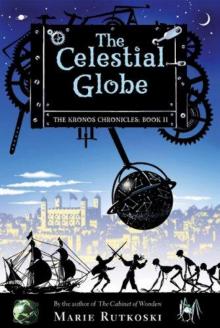 The Celestial Globe
The Celestial Globe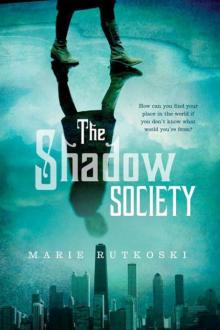 The Shadow Society
The Shadow Society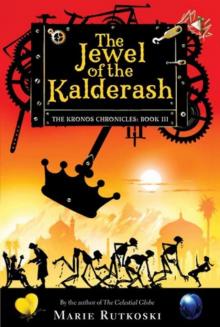 The Jewel of the Kalderash
The Jewel of the Kalderash The Winner's Kiss
The Winner's Kiss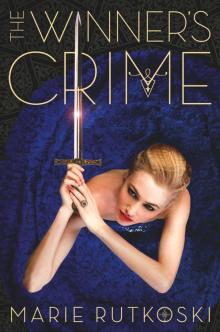 The Winner's Crime
The Winner's Crime The Winner's Curse
The Winner's Curse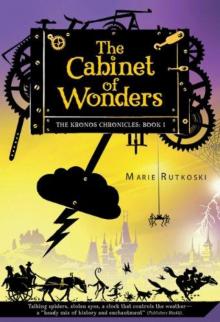 The Cabinet of Wonders
The Cabinet of Wonders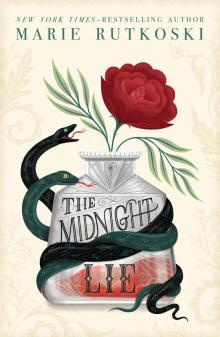 The Midnight Lie
The Midnight Lie The Hollow Heart
The Hollow Heart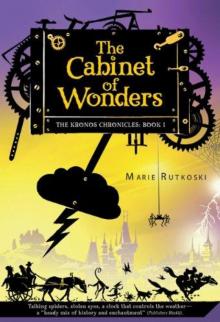 The Cabinet of Wonders: The Kronos Chronicles: Book I
The Cabinet of Wonders: The Kronos Chronicles: Book I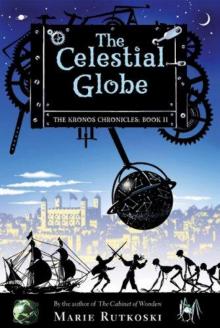 The Celestial Globe: The Kronos Chronicles: Book II
The Celestial Globe: The Kronos Chronicles: Book II